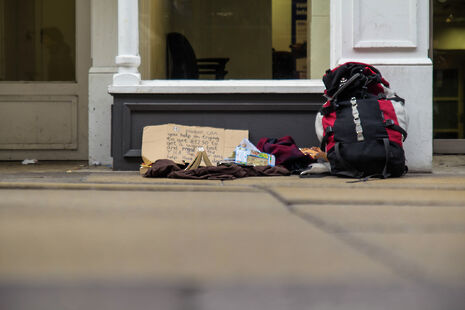‘Let’s Love Cambridge’s Homeless’ distributes care packages to the homeless
The event was attended by an estimated 70 volunteers

Students at the University have come together to distribute care packages to homeless people in Cambridge.
The event, called 'Let's Love Cambridge's Homeless' and organised by Ella Jenkinson and Ryan Rodrigues, brought together volunteers to distribute bags provided by Jimmy's Night Shelter, containing maps, chocolate bars, crisps, hand-sanitiser, chewing gum, water, and essential information, including emergency numbers.
Also provided was an impressive selection of sandwiches from the local branch of EAT, who regularly donate their left-over fresh food to outreach programmes like Streetbite, as well as a few hot meals from local vendors.
Jenkinson opened the event with a speech to those who had come to support the campaign, in which she sought to emphasise that the event was part of a consistent pattern of student work with the homeless population of Cambridge, and not merely a reaction to recent controversy.
Earlier this month, student Ronald Coyne was filmed attempting to burn a £20 note in front of a homeless man, which met with a number of responses from local people and students. 'Let's Love Cambridge's Homeless' was symbolically held in Coyne's college of Pembroke.
Jenkinson was keen to stress that Let’s Love Cambridge’s Homeless, although prompted and popularised by recent events, was “something charities have been doing in Cambridge long before [the organisers] thought of this event”.
This message was later reinforced by one of the Team Leaders, who wanted to remind the volunteers that their work was not part of a “guilt trip event”.
The organisers estimated that by the end of the night, 30-40 homeless people were helped by approximately 70 volunteers who went out.To distribute the packages, volunteers were split into small groups, each directed by a Team Leader who had been advised on dealing with both sensitive matters and media intrusion, and sent out to deliver the care packages to Cambridge’s homeless population along various routes through town.
Some present expressed discontentment with local councils' efforts to deal with homelessness. One Team Leader, discussing the increase in homelessness nationwide, raised the habit of local councils and shelters of “sending people on their way”, forcing those without anywhere to live to leave their hometowns and relocate.
This sentiment was echoed later by one of the homeless men helped by the scheme, Jay, who believed local councils could be doing more to tackle the problem.
Jay also pointed out that while Coyne’s actions were abhorrent, they had led to marked increases in donations and, as one volunteer described them, “random acts of kindness” around the city. He even described being given relatively large donations from reporters from the national papers who had interviewed him about events earlier in the month. In all, nonetheless, Jay expressed low expectations for the future of the cause.
The event's organisers, however, were keen to keep their volunteers involved. In a post the following day Ella provided the details of seven local organisations that students were invited to get involved with, in a bid to encourage a continued effort
 Comment / Anti-trans societies won’t make women safer14 November 2025
Comment / Anti-trans societies won’t make women safer14 November 2025 News / Controversial women’s society receives over £13,000 in donations14 November 2025
News / Controversial women’s society receives over £13,000 in donations14 November 2025 Fashion / You smell really boring 13 November 2025
Fashion / You smell really boring 13 November 2025 Features / Beyond the Pitt Club: The Cambridge secret societies you have never heard of16 November 2025
Features / Beyond the Pitt Club: The Cambridge secret societies you have never heard of16 November 2025 News / A matter of loaf and death17 November 2025
News / A matter of loaf and death17 November 2025








